Song elites struggled for power

Powerful Relations: Kinship, Status, and the State in Sung China
Author: Beverly Bossler
Translator: Liu Yunjun
Publisher:
Jiangsu People’s Publishing LTD
Centered on the interaction among kinship, social status and bureaucratic positions in the Song Dynasty (960-1279), Powerful Relations: Kinship, Status, and the State in Song China makes a contribution to the debate over the nature of Song elites, which underwent a transformation from the “bureaucratic elite” to the dispersed “local elite.”
The book offers a revisionist perspective on the work of Robert Hartwell and Robert Hymes, but presents deeper and more detailed insight. It argues that there were trends in social mobility in the Song era.
One is the prevailing hierarchy that has existed since ancient times, while the other is the awareness of the equality enabled by the imperial examination mechanism, which started in the Tang Dynasty (618-907), was further developed in the Song Dynasty and flourished in the Ming and Qing dynasties (1368-1911).
These trends show a social order that favored the high-ranking political elites was nearly impossible to maintain, while a rising group whose power and prestige was more locally circumscribed had yet to take charge.
The author suggests that in the transition, kinship remained a valuable social and political asset, but familial background was no longer a guarantee of a political career. Instead, there emerged a brand new understanding that individuals were capable of changing the fate of their clansmen. In other words, scholars could come to power with just their bare hands. Such a notion encouraged people to value education, marriage and social networks, which constituted important factors in the power shift during a period of social mobility.
Without inherited noble status, the line between nobility and poverty was not an unconquerable steel wall. In the joint effect of imperial examinations and marriages, the society moved toward a civil one, which, in a way, exposes the fallacy of a “stagnant” Chinese society.
Maybe the inherited and stable hierarchy was no longer in existence, but the mobile yet fragile class differentiation was deeply rooted in society. While local elites struggled to climb the political ladder, noble high-ranking officials were occupied in working social and marital networks to ensure their status. As the author pointed out, in the transitional era, everyone revealed a sense of anxiety toward their uncontrollable lives and fates.
